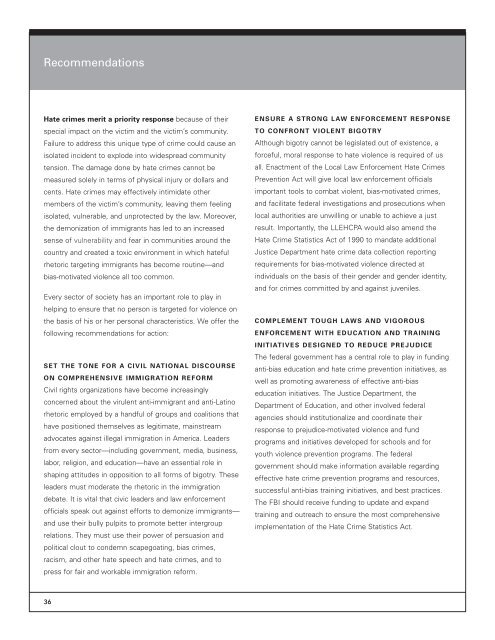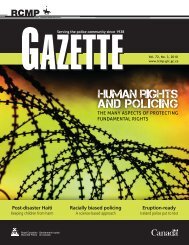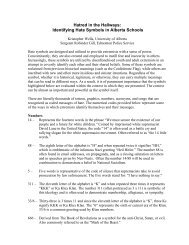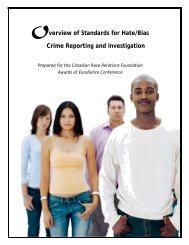Confronting the New Faces of Hate - Alberta Hate Crimes Committee
Confronting the New Faces of Hate - Alberta Hate Crimes Committee
Confronting the New Faces of Hate - Alberta Hate Crimes Committee
You also want an ePaper? Increase the reach of your titles
YUMPU automatically turns print PDFs into web optimized ePapers that Google loves.
Recommendations<br />
<strong>Hate</strong> crimes merit a priority response because <strong>of</strong> <strong>the</strong>ir<br />
special impact on <strong>the</strong> victim and <strong>the</strong> victim’s community.<br />
Failure to address this unique type <strong>of</strong> crime could cause an<br />
isolated incident to explode into widespread community<br />
tension. The damage done by hate crimes cannot be<br />
measured solely in terms <strong>of</strong> physical injury or dollars and<br />
cents. <strong>Hate</strong> crimes may effectively intimidate o<strong>the</strong>r<br />
members <strong>of</strong> <strong>the</strong> victim’s community, leaving <strong>the</strong>m feeling<br />
isolated, vulnerable, and unprotected by <strong>the</strong> law. Moreover,<br />
<strong>the</strong> demonization <strong>of</strong> immigrants has led to an increased<br />
sense <strong>of</strong> vulnerability and fear in communities around <strong>the</strong><br />
country and created a toxic environment in which hateful<br />
rhetoric targeting immigrants has become routine—and<br />
bias-motivated violence all too common.<br />
Every sector <strong>of</strong> society has an important role to play in<br />
helping to ensure that no person is targeted for violence on<br />
<strong>the</strong> basis <strong>of</strong> his or her personal characteristics. We <strong>of</strong>fer <strong>the</strong><br />
following recommendations for action:<br />
SET THE TONE FOR A CIVIL NATIONAL DISCOURSE<br />
ON COMPREHENSIVE IMMIGRATION REFORM<br />
Civil rights organizations have become increasingly<br />
concerned about <strong>the</strong> virulent anti-immigrant and anti-Latino<br />
rhetoric employed by a handful <strong>of</strong> groups and coalitions that<br />
have positioned <strong>the</strong>mselves as legitimate, mainstream<br />
advocates against illegal immigration in America. Leaders<br />
from every sector—including government, media, business,<br />
labor, religion, and education—have an essential role in<br />
shaping attitudes in opposition to all forms <strong>of</strong> bigotry. These<br />
leaders must moderate <strong>the</strong> rhetoric in <strong>the</strong> immigration<br />
debate. It is vital that civic leaders and law enforcement<br />
<strong>of</strong>ficials speak out against efforts to demonize immigrants—<br />
and use <strong>the</strong>ir bully pulpits to promote better intergroup<br />
relations. They must use <strong>the</strong>ir power <strong>of</strong> persuasion and<br />
political clout to condemn scapegoating, bias crimes,<br />
racism, and o<strong>the</strong>r hate speech and hate crimes, and to<br />
press for fair and workable immigration reform.<br />
ENSURE A STRONG LAW ENFORCEMENT RESPONSE<br />
TO CONFRONT VIOLENT BIGOTRY<br />
Although bigotry cannot be legislated out <strong>of</strong> existence, a<br />
forceful, moral response to hate violence is required <strong>of</strong> us<br />
all. Enactment <strong>of</strong> <strong>the</strong> Local Law Enforcement <strong>Hate</strong> <strong>Crimes</strong><br />
Prevention Act will give local law enforcement <strong>of</strong>ficials<br />
important tools to combat violent, bias-motivated crimes,<br />
and facilitate federal investigations and prosecutions when<br />
local authorities are unwilling or unable to achieve a just<br />
result. Importantly, <strong>the</strong> LLEHCPA would also amend <strong>the</strong><br />
<strong>Hate</strong> Crime Statistics Act <strong>of</strong> 1990 to mandate additional<br />
Justice Department hate crime data collection reporting<br />
requirements for bias-motivated violence directed at<br />
individuals on <strong>the</strong> basis <strong>of</strong> <strong>the</strong>ir gender and gender identity,<br />
and for crimes committed by and against juveniles.<br />
COMPLEMENT TOUGH LAWS AND VIGOROUS<br />
ENFORCEMENT WITH EDUCATION AND TRAINING<br />
INITIATIVES DESIGNED TO REDUCE PREJUDICE<br />
The federal government has a central role to play in funding<br />
anti-bias education and hate crime prevention initiatives, as<br />
well as promoting awareness <strong>of</strong> effective anti-bias<br />
education initiatives. The Justice Department, <strong>the</strong><br />
Department <strong>of</strong> Education, and o<strong>the</strong>r involved federal<br />
agencies should institutionalize and coordinate <strong>the</strong>ir<br />
response to prejudice-motivated violence and fund<br />
programs and initiatives developed for schools and for<br />
youth violence prevention programs. The federal<br />
government should make information available regarding<br />
effective hate crime prevention programs and resources,<br />
successful anti-bias training initiatives, and best practices.<br />
The FBI should receive funding to update and expand<br />
training and outreach to ensure <strong>the</strong> most comprehensive<br />
implementation <strong>of</strong> <strong>the</strong> <strong>Hate</strong> Crime Statistics Act.<br />
36







